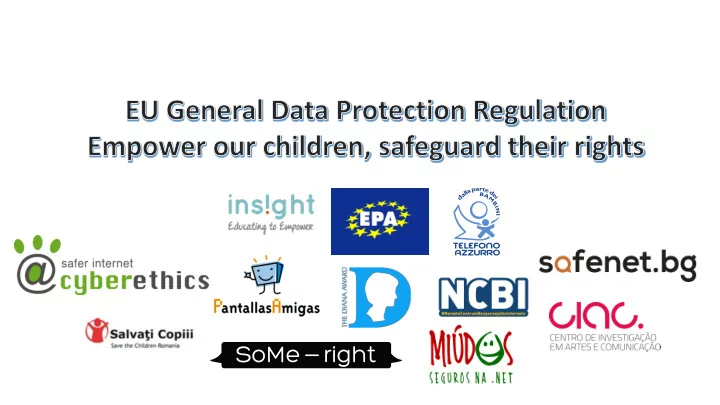

Our working group appreciates that the GDPR… …aims to ensure that ‘information society services’ providers: Ø appoint a data protection officer Ø treat users’ data transparently and fairly Ø are unable to transfer personal data to third parties without explicit consent from the user Ø implement the right to be forgotten Ø refrain from data profiling on children
What concerns us: Ø comes into force across the EU in May 2018, but no real public debate yet Ø anyone under age 16* requiring parental consent to access ‘information society services’ Ø ‘information society services’** seems to include a wide range of services that teens use daily at home, at school, on mobiles, but the term is not sufficiently regulated *Article 8 of the GDPR states: Member States may provide by law for a lower age for those purposes provided that such lower age is not below 13 years. ** definition from eur-lex directive 2000/21/EC (18)
The GDPR renders obligatory parental consent for under 16s! Ø infringes the rights of parents to protect their children from radical and false information and teach them to respect the rights, freedoms and reputations of others as they see best* Ø infringes the rights of children to freely access and share information, exercise freedom of thought, conscience and religion, and to meet and join groups*(universal freedom of association & assembly) Ø places a responsibility on parents & teens and sidesteps the real issue * Source : United Nations Convention on the Rights of the Child
In this regards, the GDPR will most likely also: Ø create discrimination between countries and children Ø reduce teens’ learning opportunities to master 21 st century skills Ø conflict with their need to progressively (l)earn their autonomy Ø Require companies to collect more information than they otherwise would, e.g. geolocation, to respect verification requirements!
Viewpoint of the European Parents Association representing 150 million parents across Europe “We are against compulsory parental consent for two reasons: 1. it is too easy to fake, 2. parents and children should come to an agreement they suits them both. In our opinion, forcing something on them is a violation of parents’ rights. What we urge from providers, companies, online shops, etc. is to make it possible for minors to withdraw their order, their input, etc. We also wish to know more about the mechanisms to be used to prove parental consent. How will this impact on our children’s use of information society services in school?”
The way forward? Ø Work together as European citizens to shape our own future Ø Raise national awareness and open the debate with MEPS, DPAs, parent associations… Ø Push the debate into schools to have teens share their point of view, their stories and their earlier experience Ø Share all ideas and results through a common platform e.g. our Facebook page ‘GDPRhaveyoursay’ Ø The GDPR working group is open to all; our aim is informed debate for all. Janice.richardson@insight2act.net
Recommend
More recommend